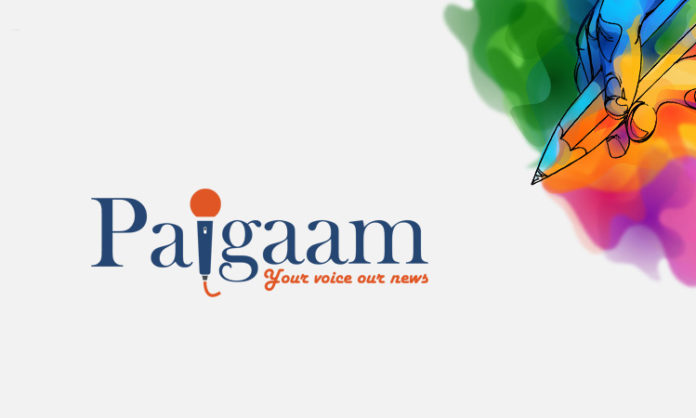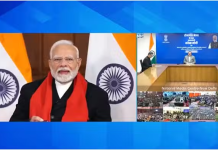New Delhi, July 29: Schools and educational institutions will remain closed until July 31, the Ministry of Home Affairs said on Monday in its new Unlock 2 guidelines.
The ministry’s guidelines for easing lockdown restrictions said all activities except for certain prohibited ones will be permitted outside containment zones. Lockdown will continue in containment zones until July 31.
Metro rail services will remain suspended, as will pools, cinemas and gymnasiums. Dates for resuming these activities will be decided later.
The Home Ministry said the new guidelines will come into effect from July 1, 2020 and the process of phased re-opening of activities has been extended further.
“The new guidelines, issued today, are based on feedback received from States and UTs, and extensive consultations held with related central ministries and departments,” the MHA said in the release.
“As stipulated in the Unlock 1 order and guidelines issued on May 30 2020, certain activities, including religious places and places of worship for public; hotels, restaurants and other hospitality services; and shopping malls; have already been permitted from June 8, 2020 outside the Containment Zones. Detailed standard operating procedures (SOPs) have also been issued,” it said.
Domestic flights and passenger trains have already begun,the guidelines say.
“Their operations will be further expanded in a calibrated manner,” the guidelines say.
Curfew hours have been extended. They will now be in force from 10 pm to 5 am.
Containment zones
Only essential activities will be permitted in containment zones—areas that district authorities have been tasked with demarcating.
“Containment Zones will be demarcated by the District authorities after taking into consideration the guidelines of Ministry of Health & Family Welfare (Mol-IFW) with the objective of effectively breaking the chain of transmission,” the guidelines say.
These zones will be notified on the websites of the district administration and the state governments.
States and UTs have the discretion to prohibit some activities or impose outside the containment zones, but cannot stop interstate movement of people and goods.
Protection of vulnerable persons
The guidelines say people over 65, those with co-morbidities, pregnant women and children below 10 should stay home except for essential and health purposes.
The old guidelines issued on May 30 will remain in effect until June 30.
The development comes on a day when a single-day spike of 19,459 COVID-19 cases took India’s tally to 5,48,318, while the death toll climbed to 16,475 with 380 new fatalities, according to the Union Health Ministry data.
The central government has been slowly easing restrictions first imposed in March to contain the spread of coronavirus. States like Maharashtra and Tamil Nadu have already announced they were extending lockdown.
Here’s what the guidelines say:
In areas outside Containment Zones, all activities will be permitted, except the following:
(i) Schools, colleges, educational and coaching institutions will remain closed till 3| July. 2020. Online/ distance learning shall continue to be permitted and shall be encouraged.
Training institutions of the Central and State Governments will be allowed to function from 15 July, 2020, for which Standard Operating Procedure (SOP) will be issued by the Department of Personnel & Training (DoPT).
(ii) lnternational air travel of passengers, except as permitted by MHA.
(iii) Metro Rail
(iv) Cinema halls, gymnasiums, swimming pools, entertainment parks, theatres, bars, auditoriums, assembly halls and similar places.
(v) Social/ political/ sports/ entertainment/academic/ cultural/ religious functions and other large congregations.
Dates for re-starting the above activities may be decided separately and necessary.
SOPs shall be issued for ensuring social distancing and to contain the spread of COVID-l9. Domestic nights and passenger trains have already been allowed in a limited manner. Their operations will be further expanded in a calibrated manner.
Night curfew
Movement of individuals shall remain strictly prohibited between 10.00 pm to 5.00 am throughout the country, except for essential activities, including operation of industrial units in multiple shins, movement of persons and goods on National and State Highways, loading and unloading of cargo and travel of persons to their destinations after disembarking from buses, trains and airplanes. Local authorities shall issue orders, in the entire area of their jurisdiction under appropriate provisions of law such as under Section 144 of CrPC, and ensure strict compliance.
National Directives for COVID-19 Management
National Directives for COVlD-l9 Management, as specified in Annexure I, shall continue to be followed throughout the country.
Lockdown limited to Containment Zones
(i) Lockdown shall continue to remain in force in the Containment Zones till 31 July, 2020.
ii) Containment Zones will be demarcated by the District authorities after taking into consideration the guidelines of Ministry of Health & Family Welfare (Mol-IFW) with the objective of effectively breaking the chain of transmission. These Containment Zones will be notified on the websites by the respective District Collectors and by the States/ UT and information will be shared with MOHFW.
(iii)In the Containment Zones, only essential activities will be allowed. There will be strict perimeter control to ensure that there is no movement of people in or in out of these zones, except for medical emergencies and for maintaining supply of essential goods and services. In the Containment Zones, there shall be intensive contact tracing, house-to-house surveillance and other clinical interventions as required. Guidelines of MoHFW shall be effectively implemented far the above purpose.
(iv) Activities in the Containment Zones shall be monitored strictly by the State/ UT authorities, and the guidelines relating to containment measures in these zones shall be strictly implemented.
(v) States/ UTs may also identify Buffer Zones outside the Containment Zones where new cases are most likely to occur. Within the buffer zones, restrictions as considered necessary may be put in place by district authorities.
States/UTs, based on their assessment of the situation, may prohibit activities outside the containment zones, or impose such restriction as may be deemed necessary.
However, there shall be no restriction on inter-State and intra-state movement of person and goods including those for cross land-border trade under Treaties with neighbouring countries. No separate permission/ approval/ e-permit will be required for such movements.
Movement of person with SOPs
Movement by passenger trains and Shramik special mint; domestic passenger air travel; movement of lndian Nationals stranded outside the country and of specified persons to travel abroad; evacuation of Indian nationals and sign-on and sign-off of Indian seafarers will continue to be regulated as per SOP issued.
Protection of vulnerable persons
Persons above 65 years of age, persons with co-morbidities, pregnant women and children below the age of 10 years are advised to stay at home except for essential and health purposes.














































